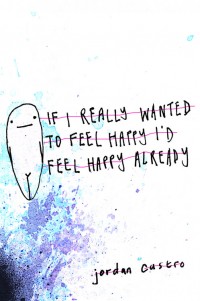25 Points: If I Really Wanted to Feel Happy I’d Feel Happy Already
 |
If I Really Wanted to Feel Happy I’d Feel Happy Already
by Jordan Castro
Civil Coping Mechanisms, 2014
162 pages / $13.95 buy from Amazon
|
1. This book and it being read by me results in me saying that Jordan Castro is like a really cool stand-up comedian sometimes.
2. A thoughtful, off-beat, occasionally philosophical stand-up comedian who plays to small audiences of people who are ‘in the know’ but could sell out bigger shows but perhaps wouldn’t want too but might think about it a little bit but wouldn’t want too.
3. The title is another one of those fucking ace, long titles isn’t it. Have you read it (see above)? Good isn’t it. Becoming something of a tradition isn’t it – the long, good, title.
4. Castro is…no, no I’m not going to call him that. Not going to just call him by his surname like they do in reviews. It feels a bit like a teacher talking about a pupil or a factory owner (A factory owner? Fuck! What century am I in?) talking about a worker in a slightly patronising way. So, yeah. Jordan Castro is a fan of circular reasoning, it pops up throughout the book. He gets all circulus in probando (Wikipedia) on our ass all the time.
5. Or maybe he’s not a fan of circular reasoning. Maybe these things trap him and impede his life like they do with all of our lives and he finds it’s best to try and write about them to circumvent this trap slightly and if we read him we can slightly circumvent our own circular traps. Just slightly. I don’t think he’s trying to write a miracle cure.
6. This book isn’t a miracle cure. Never believe in miracle cures. They don’t exist. They’re all scams. This book isn’t a scam. This book is upfront about things, about everything that’s going on in the minutiae of everyday life. It’s not a miracle cure but it might help. Plus it’s really funny and entertaining too, which helps.
7. The tale of a character named ‘Sarah’ that starts on p.95 is the tale of everyone nowadays who is under 40 and many over 40 and soon everyone in the western world and later everyone in every other type of world (this latter depends on a few things that are currently, to put it politely, ‘in flux’ in global affairs) but they won’t all be named Sarah.
8. In this one:’got a lot of allergies/been thinking about literature/for maybe five hours’, he’s secretly thinking about the sounds of words at the end of lines like an old fashioned poet but is hiding it even though he’s made it really subtle and really good.
9. Pages 115-119 make me realise that social media is so bedded-in in America that people really do view it as part of their real identity and really do agonise about what statuses they type and how they’ll be perceived and how many ‘Likes’, ‘Comments’, ‘Notes’ or whatever it will/should get in a way that is only really just starting to happen in the UK and in a way which sometimes depresses them.
10. I read somewhere in an interview with Noah Cicero (it could’ve been from ages ago, he might have changed his opinion by now, I don’t know. Anyway, he’s entitled to his opinion) that he didn’t really rate David Foster Wallace as being too much to do with Alt-Lit type of stuff but point number 9 makes me want everyone to read this essay by David Foster Wallace on television and then for someone else, someone who is still alive, and someone who, like me, doesn’t have to work full-time to re-write that essay, updating it for today’s social media landscape and for us all to see how prescient it was in the first place.
October 13th, 2014 / 12:00 pm
